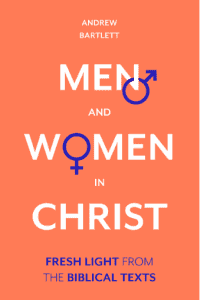 Andrew Bartlett says Yes in new book Men and Women in Christ. (#ad)
Andrew Bartlett says Yes in new book Men and Women in Christ. (#ad)
First, we have to admit some truths and here are his own big-theme conclusions:
After it became clear that the traditional view of women’s innate inferiority was out of step with Scripture, there began a reformation [not The Reformation] in the Christian understanding of what the Bible teaches about men and women. New interpretations have been advanced. We have tested these against the words of Scripture, read in context. Fresh light is still emerging. Complementarian interpretations have not taken the reformation [not The Reformation] far enough, because they still retain unjustified restrictions on women’s ministry in the church, and some still depict marriage as a hierarchical relationship. Egalitarian interpretations of Christian marriage seem to have taken the reformation [not The Reformation] too far, since they deny any definite differentiation of responsibilities of husband and wife beyond the biological. The labels ‘complementarian’ and ‘egalitarian’ are unhelpfully restrictive, because they over-simplify the task of interpretation. It is time to move beyond them. Faithfulness to God and his word requires a revitalized conversation in which we will strive for unity of relationship and of understanding, in order to please the Lord and be a blessing to his world.
He points then to his own peace-making summaries:
Men and women are created by God to be different (Gen. 2). The woman is to be the man’s powerful ally. Husbands are not called to be rulers of their wives. The only explicit statement in the Bible about the rule of man over woman is in Genesis 3:16, which presents this as a negative consequence of the fall. There is no statement anywhere in the Bible that husbands ought to exercise unilateral authority over their wives. Christian husbands are called to a special responsibility of self-sacrificial service to their wives, in demonstration of the self-sacrificial love of Christ for his bride, the church (Eph. 5).
Uthough God’s design does not make husbands masters over their wives, wives are nevertheless called to submit to their husbands. This is for several reasons, particularly to imitate the humility of Christ (Eph. 5; 1 Pet. 2 – 3). But both partners are called to humility and love. In the marriage relationship husband and wife have equal authority and are called to yield to one another (1 Cor. 7:3-5).
In the New Testament, most prominent roles in the church are fulfilled by men. But the question at issue is whether there is a general biblical ban on women’s involvement in church leadership. There is not. Women and men are united in Christ on an equal footing. Ministry is gift-based, not gender-based (Rom. 12:3-8; 16:7; 1 Cor. 12:1-30; Eph. 4:11-13; 1 Pet. 4:10-11).
Then some his wider themes:
1. The paradox of equality and humility
2. Creation and new creation
3. What it means to be male or female
4. Raising expectations of ScriptureThe importance of the divine mandate of unity
The obstacles to unity
1. Ongoing disagreements on interpretation of Scripture
2. Egalitarian misunderstanding of the nature and motivations of the debate
3. How complementarians characterise the debate
4. Re framing the debate














